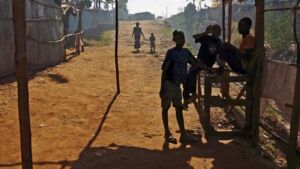正文
Providing Electricity to Poor Communities in Kenya
In 2013, President Barack Obama launched a campaign called the Power Africa Initiative. Its goal is to increase the availability of electric power in African countries south of the Sahara Desert. Millions of people there are unable to depend on reliable power supplies.
The American-supported program is providing money for a number of projects, including one that creates electricity from human waste.
“Mukuru Kwa Njenga” is the name of a community close to Nairobi where about 100,000 people live. Many of them are poor. Until recently, most did not have electricity. Those who did had illegal connections to power lines.
Amos Nguru had the idea for Afrisol Energy, a project that produces electricity from human waste. Two years ago, Mr. Nguru received an offer of financial support from the Power Africa initiative. The money came from General Electric and the United States African Development Foundation.

The project now produces 15 kilowatts of electricity. That is enough to power a nearby school and serve the local neighborhood. Mr. Nguru says his project meets the needs of the community.
Deborah Mwandagina is deputy head teacher of the local primary school. She says in the past, there were too many illegal connections to her school’s power supply. She says this resulted in higher costs for the school, so it decided to stop using electricity.
She says, “We have been having challenges from the slums and time and again they hack our power systems and they connect illegally to their homes. We have been having such kind of challenges so we just decided we cannot live with electricity. It can’t do us any good, so we decided to disconnect.”
But now the school is once again using electricity from Afrisol Energy. Doreen Kemunto is a student at the school. Her mother Beatrice Onchan’ga says darkness no longer limits the time when Doreen can study.
She says, “Before the electricity was there our children could not be able to learn since they could not come to school that early and leave that late because the school was very dark, and they could not be able to learn.”
The World Bank says only 23 percent of Kenyans have access to electricity.
I’m Jim Tedder.
Lenny Ruvaga reported this story from Nairobi. Christopher Jones-Cruise adapted it for Learning English. George Grow was the editor
相关文章
- Brazilian Painter Brings Attention to Threatened Amazon Rainforest
- Chinese Parents Praise Rule Limiting Video Game Time
- Pfizer Says COVID-19 Vaccine Safe for Children 5-11
- Former Diplomat Likely to Become Japan’s Next Prime Minister
- Two Americans Win Nobel Medicine Prize for Body Sensory Findings
- Creators of Molecule Building Tool Win Nobel Prize in Chemistry
- Japan’s Princess Mako Goes Ahead with Marriage Plans
- Robots Do It All at Japanese Car Factory
- Solar Panels Help French Winemaker Deal with Climate Change
- S. Korea Launches Group to Debate ‘Living with COVID-19’




 手机网站
手机网站